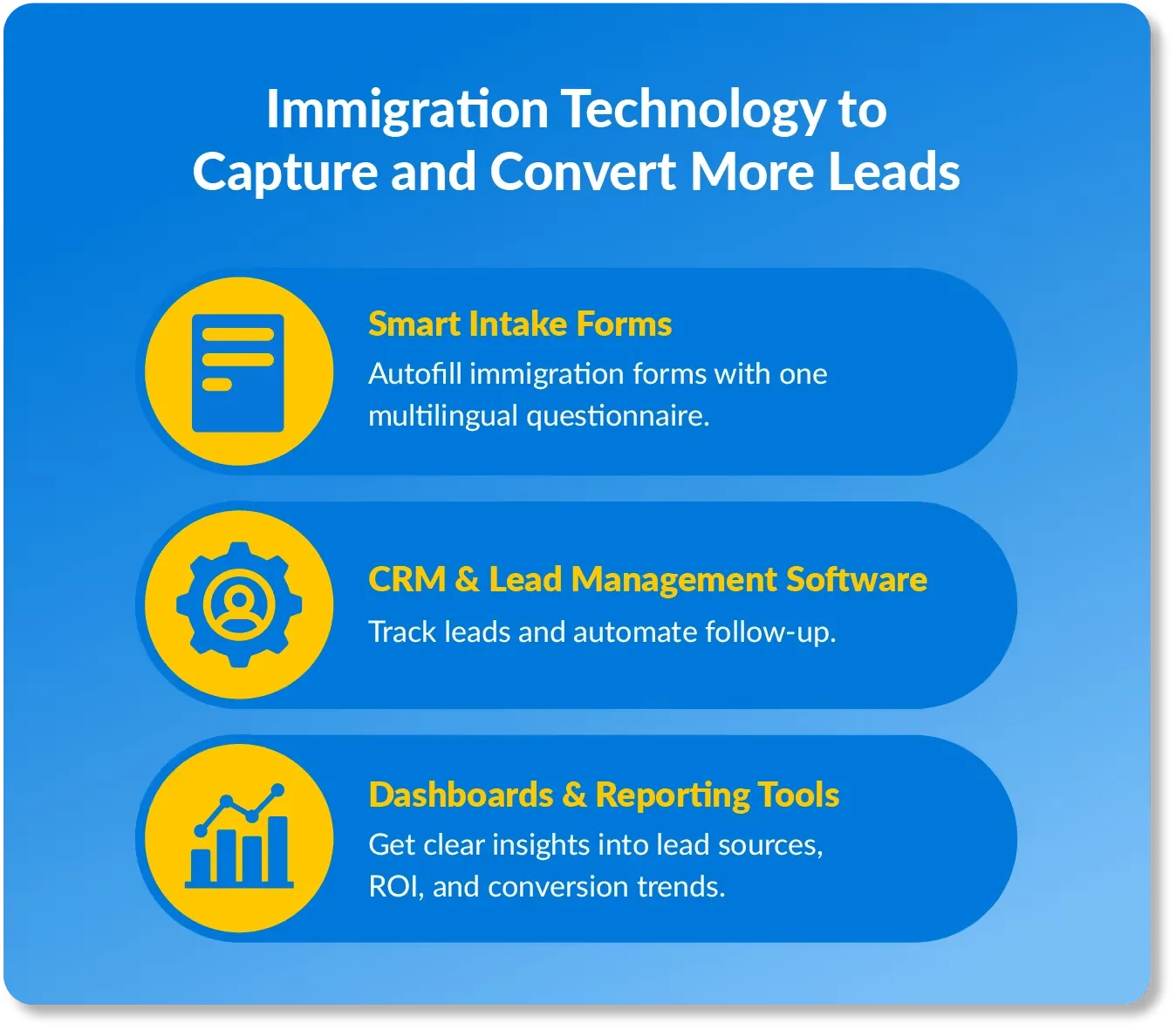There are over 50 million immigrants living in the United States, and all of them have to navigate the complex web of immigration law in some form. Yet, the publication Immigration Impact notes that only 30% of immigrants with pending cases have secured representation.
With frequently changing immigration laws, new digital filing systems, and complex application processes, there’s a striking demand for high-quality immigration legal services.
One might think that rising demand would instantly lead to immigration lawyers and firms getting more clients, but it’s not always so simple.
Immigration law is highly complex, and finding clients that are a good fit for your specific expertise is often easier said than done. That’s why immigration lawyers need to understand how to generate qualified leads to maintain long-term success.
In this article, we’ll cover:
How digital marketing has upended the legal marketing landscape
The basics of law lead generation for immigration law
Expert tips on the best lead generation tactics for immigration law firms
Why Lead Generation Is Crucial for Immigration Law Firms
The term “lead generation” is a sales and marketing term that refers to the overall process of turning someone interested in a business’s product or services into a paying customer.
In the context of immigration law, a “lead” is any potential client who might be interested in using your services—but how leads are defined (and measured) can vary. They may include:
Visitors to your website
People who clicked on one of your ads
Someone who submitted contact information to you or filled out a form
A person who called into your office
How you engage with leads depends on their stage of the process. For example, are they just looking for general information on immigration law, or are they actively vetting different lawyers for representation?
This is why effective immigration lawyer marketing is geared toward curating marketing material that engages potential clients at any stage of the process.
A “qualified lead” is a good fit for your firm and has a high chance of becoming a client. Fine-tuning your lead generation process is the key to finding more qualified leads and differentiating yourself from the competition. While it sounds easy enough on the surface, there is a wide variety of strategies law offices can use.
Hiring a Lead Generation Agency vs. Generating Leads In-House
The goal of immigration law lead generation is to capture a potential client’s attention, build trust with them, and then motivate them to ultimately contact your firm.
To achieve this, you can either generate leads through your own in-house marketing strategies, or pay for leads via a lead generation company. Each method has its pros, cons, and ideal use cases.
Generating Leads In-House
Investing in an in-house immigration lawyer marketing strategy can be time-consuming, requires a higher upfront investment, and necessitates some trial and error (especially if you don’t have previous experience with digital marketing).
However, investing resources in strategies like search engine optimization (SEO), networking, and informative content helps build trust with potential clients and boost referrals in the long term. Additionally, since you’ll be involved in your marketing firsthand, you’ll have a better sense of what’s working and what doesn’t, helping you refine your marketing strategy and reduce your cost-per-lead and generate more quality leads overall.
That said, when starting an immigration law practice, marketing is just one of the many priorities. You may not have the time and resources to dedicate to building an effective marketing strategy for lead generation.
Hiring a Lead Generation Agency
Another method for steering potential clients toward your firm is to pay for immigration law marketing leads using a lead generation company.
Unlike an in-house marketing strategy, an agency can free up time and resources to work on clients and casework. It also works much faster than organic marketing strategies, which can be a lifesaver, especially if your firm is new and has no established reputation. If you use lead generation companies that specialize in aggregation, you can get access to high-quality leads with minimal effort.
It’s worth noting that paying for leads may generate more leads in the short term, but generally isn’t seen as an effective long-term strategy. Keep in mind, you are not the only firm using these services, so by paying, you are still competing against other firms for potential clients.
The Best Lead Generation for Immigration Law Firms? A Hybrid Approach
So, what is the best lead generation method for law firms: paid or in-house? The answer is usually a mix of both.
The best immigration law firms build their online presence and reviews independently, then supplement it with paid lead generation services. This is true for new immigration lawyers and established firms alike.
For example, a new law firm that doesn’t have the resources for marketing staff or time for in-house marketing might benefit from hiring an agency. Then, once a few clients and steady cash flow have been achieved, the firm can invest more in building up its SEO and marketing to further build its reputation.
Conversely, an established firm with a strong online presence might still choose to use paid leads to bring in leads for more niche areas of immigration law. A firm with an established specialty can use paid lead generation to target certain demographics and channels—information that would be difficult to obtain without a strong immigration law firm marketing strategy.
In other words, striking the right balance between in-house marketing and paid services depends on your short and long-term goals.
Top Lead Generation Strategies for Immigration Lawyers
Bringing in a steady flow of immigration law leads is key to long-term success—but let’s be honest, most law schools don’t do much to prepare lawyers with the marketing skills they need to make that happen.
To help you get a better handle on immigration law firm lead generation, here is a list of some practical strategies you can employ both in-house or through a lead generation or marketing company.
Build a High-Converting Website
Just under half of all Google searches worldwide are for local information, and over 90% of people find information about businesses online. In other words, if you’re not focusing on building a user-friendly and informative website, your law firm might as well be invisible.
Many lawyers make the mistake of creating a basic website and inundating it with long blocks of text. While having informative, long-form content is great, make sure it’s where people will find it.
Some best practices for building a high-converting website include:
Make your website mobile-friendly so it looks and responds well on both computers and smartphones.
Use strong headlines that highlight your areas of expertise and services. Most users will skim over these areas of the website before reading further, so make a strong first impression.
Write detailed service pages to clearly explain your areas of expertise and how they will benefit the client. These pages will also be useful for improving your immigration firm’s SEO.
Include lead generation forms throughout your website so clients have multiple ways to contact your firm. Over time, you can monitor which pages are generating the most leads.
Extra tip: If you offer services in multiple languages, include toggles to switch between different languages or form fields that use the various languages you support.
Use strong calls to action (CTAs) that indicate exactly what you’d like a potential client to do (e.g., buttons that say “Schedule a consultation” or “Tell us how we can help”).
Ultimately, the goal of your website isn’t to flood a potential client with information but to give them easy-to-digest highlights of your expertise and make it as easy as possible to get in contact with your firm.
Partner With Other Law Firms
Many lawyers end up building a professional network that extends far outside of their practice area. Leverage those connections for mutual benefit by building a referral network.
Professional referrals generate highly qualified leads since social proof helps immediately build trust. If you find your immigration clients are asking about family law, you might want to search your contacts for family lawyers.
Before referring any clients, make sure you understand what your network specializes in and what they don’t (and vice versa). That ensures that any potential clients you send each other’s way will likely be qualified.
Last, your systems for tracking personal referrals should be just as organized as leads from any other source. Give your professional network a link to a lead referral page, ideally. If they send over leads via email, ensure they’re put into your lead management system.
Attend Community & Cultural Events
In cities and towns across the country, immigrants have built strong communities that are cultural hubs. Immerse yourself in cultural events to build contacts and goodwill in your local immigrant community.
Here are a few additional ideas you could try:
Speak at immigration support groups or events
Sponsor cultural events and festivals to build brand recognition
Host free workshops on immigration basics
Do pro bono work for immigrant advocacy and support groups
Invest in Local SEO
Improving local SEO will help you show up higher in local online search results, which is how most people find new businesses.
Here are some examples of local search terms potential clients might use:
Immigration lawyer in Denver
Best immigration law firms in Georgia
Immigration lawyer near me
How to get a fiancé visa in Illinois
Search engines like Google or Bing then take the information they’ve collected on your website and rank the results. An up-to-date website with high-quality content and solid user reviews is more likely to rank highly.
That’s why so many legal professionals invest in improving their firm’s SEO. If you’re brand new to digital marketing, there are companies that specialize in legal marketing that can help you identify and implement the most high-impact SEO tactics.
If you’re on a budget, here are some beginner SEO tips:
Ensure your Google Business Profile is accurate and up to date to show up in local search results and searches using Google Maps.
Use keywords like “immigration lawyer in [city]” or “immigration lawyer in [state]” throughout the content on your website.
Create city-based landing pages and run PPC ads to generate hyper-local leads.
Include your specialty practice areas, as these are more likely to stand out in a search.
This is by no means an exhaustive list, and thanks to AI search and other innovations, SEO best practices are constantly evolving.
Run Targeted PPC Ads
Pay-per-click (PPC) ads work by bidding for certain search keywords or phrases in which you want your ads to appear. The ad is more likely to appear for those search words based on the bid amount, ad relevance, and other factors. The publisher (e.g., Google or Meta) is paid every time a user clicks on your ad.
PPC ads are an excellent way to generate leads, especially if you use them strategically. Start by using your customer relationship management (CRM) software to see what channels (e.g., Facebook, Google, etc.) your clients used to find your firm.
You can then tailor ads to those specific channels and search terms to appear as top-rated content. The most effective way to get the best return on investment for your PPC ads is to be specific. Instead of casting a wide net (and therefore being less likely to appear), bid for specific factors like searches in a particular language and location.
Leverage Email Marketing
While it might seem old-fashioned, email marketing still has a remarkably high ROI for small business digital marketing.
For leads who give you their contact information but don’t immediately convert, a drip campaign could be a good option. A drip campaign is a sequence of automated emails to re-engage a lead and hopefully lead them back to your business.
To make these campaigns more effective, you can create a drop-down on your form asking about what type of services they need help with (e.g., green cards, deportation defense, work visas, etc.). You can then segment leads by inquiry, ensuring you send content relevant to their issue.
Additionally, it’s wise to ensure that emails have a clear next step or CTA, with a button or link that leads to a landing page or other website.
Use Pay-Per-Lead (PPL) Services
If you're looking to generate immigration leads quickly without investing in a full in-house marketing strategy, pay-per-lead (PPL) services can be a valuable option. These platforms, including Lawyers.com, FindLaw, Nolo, and Avvo, connect potential clients directly with attorneys based on their legal needs and location.
These services operate straightforwardly: You pay a set fee for each lead they send your way. This can help new immigration law firms gain visibility fast, especially if you haven’t yet built up a strong web presence or referral network. For example, if someone searches for “immigration attorney in Houston” on one of these platforms, and your profile matches, you may be offered that lead for a price.
However, it’s important to approach PPL with realistic expectations. While they offer convenience and speed, you won’t always have much control over the quality or type of leads you receive. Not every lead will align with your firm’s niche expertise or capacity—some may be looking for services you don’t offer, or they may not be ready to move forward with legal representation.
Tips for Converting Immigration Leads Into Clients
Capturing a lead doesn’t benefit your firm unless you can turn them into a paying client. That’s why it’s vital to establish consistent lead nurture and client intake processes to improve your conversion rates.
Here are some important points to keep top of mind:
Don’t Wait to Follow Up: Digital communication has changed people’s expectations, and the majority of customers today expect responses from businesses within 24 hours. Ensure you have both automated replies for form submissions and a process in your CRM software for consolidating information and following up with qualified leads.
Consistency is Key: Creating a consistent client intake process is essential. Use your case management software to create client intake forms for easy information retrieval. You should also follow a simple script for client intake calls to ensure you get all the information you need.
Set Clear Expectations: Don’t overpromise or underdeliver. Ensure that clients know what to expect at every stage of the intake process so everyone is on the same page.
Avoid Jargon: Immigration law is complex and intimidating. Avoid using legal jargon when consulting with clients, and focus on explaining your services in plain language.
Take Notes: Take detailed notes on previous client communication so you don’t waste time and pick up right where you left off.
Immigration Technology to Capture and Convert More Leads
Having consistent lead nurture and client intake processes boosts conversion rates and creates a positive client experience. However, if you’re using manual processes to manage your lead generation process, you’re putting your reputation and success at risk.
That’s why an increasing number of immigration lawyers rely on legal technology to streamline their processes so they can do more with less.
Here are some of the top tools your firm can use to improve legal lead generation:

Smart Intake Forms
Client intake forms are necessary to gather the vital information you need to check for conflicts and qualify a lead. However, it can also be a tedious process for clients. If they’re asked to repeatedly fill out the same information over and over again, they might give up on the process altogether.
Instead, use smart intake forms to help simplify the process. A smart intake form enables a potential client to fill out a single multilingual questionnaire, then use that information to autofill multiple immigration forms.
Not only does this save time, but it also reduces errors that can result from repeated data entry.
CRM & Lead Management Software
Keeping information on the various people who contact your office might be easy enough early on in your career. But as business picks up, relying on memory alone is a recipe for disaster.
Even when reviewing emails or old notes, it can be difficult to quickly locate the relevant information you need, and if clients feel like you’re not attentive, they’ll go somewhere else.
CRM and lead management software consolidates information from current and potential clients, assists in scheduling and communication, and gives you an overview of your lead generation efforts.
With CRM software, client information is entered into the system the minute they fill out a contact form. You can then create workflows to ensure you follow up with them promptly.
At a glance, software for immigration law leads lets you:
See lead status, last communication time, and more at a glance
Distribute leads between team members
See communication records, case notes, and other information for every potential client
Automate messages to clients
Leveraging technology, you can improve response times, easily personalize communication, and measure the success of marketing efforts.
Dashboards & Reporting Tools
It’s impossible to improve your firm’s lead generation strategy without the ability to take an honest look at the data. Without visibility into your lead generation pipeline, it’s incredibly difficult to identify what’s working and what’s not.
One of the main benefits of using a CRM system is that it’s constantly generating invaluable data every time a customer enters the system, an automated action is taken, you schedule a consultation, send a follow-up communication, or do anything else.
The reporting and analytics dashboards included in CRM software help you contextualize this wide range of data to provide insights into:
Lead sources
Marketing effectiveness and ROI
Conversion rate
Intake trends (i.e., are people consistently leaving at a specific step in the intake process)
Cost-per-lead
This data helps you find gaps in your intake processes and improve the effectiveness of your marketing spend.
Docketwise Helps Immigration Law Firms Manage Leads
There is no such thing as a perfect lead generation process. Client expectations and needs are constantly changing, and immigration lawyers must stay on their toes to adapt.
However, by mastering the fundamentals of client intake and leveraging the right technology, you’ll be able to stay ahead of trends as they evolve.
Using software solutions tailored to your practice area can significantly improve the client experience, helping to bolster both lead capture and case conversion.
Docketwise is a comprehensive solution for immigration lawyers. It combinies extensive immigration form and case management with powerful CRM tools to give immigration lawyers everything they need to succeed.
With Docketwise CRM, you can boost conversions and streamline your legal marketing with features like:
Automated Workflows: Automatically capture leads from your website or chatbot, centralize them in your CRM, and trigger reminders for follow-up, ensuring no lead falls through the cracks.
Lead Organization & Tracking: Maintain a clear overview of your potential clients with easy-to-use dashboards that track lead information, communication history, and conversion stages.
Streamlined Communication: Engage through built-in tools like email or text messaging, fostering personalized interactions and converting them into clients.
Schedule a Docketwise demo today to see how the right technology can help you achieve more.
Carve Your Niche in Immigration Law
Unlock the potential of your personal brand and set yourself apart in the world of immigration law. Harness the tools, strategies, and insights to become the go-to expert in the immigration law landscape.
Download Now
About the author
Michael Miello is a digital marketing strategist, designer, and educator specializing in high-converting websites and SEO. As a content writer for Docketwise, he covers emerging legal technology, financial wellness for law firms, the latest industry trends, and the latest industry trends.

